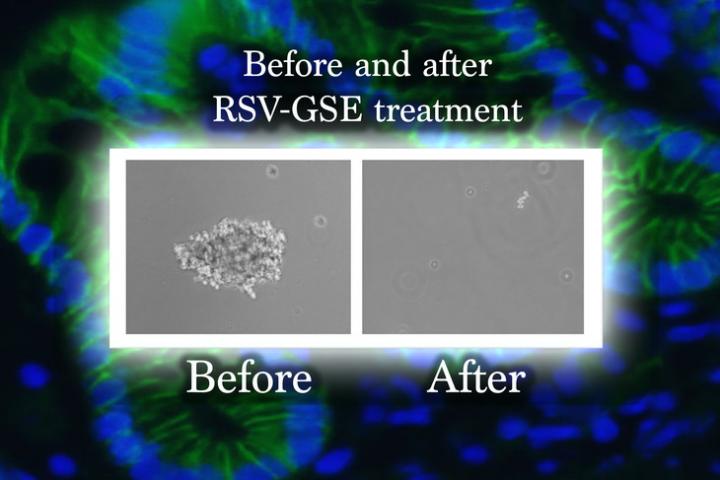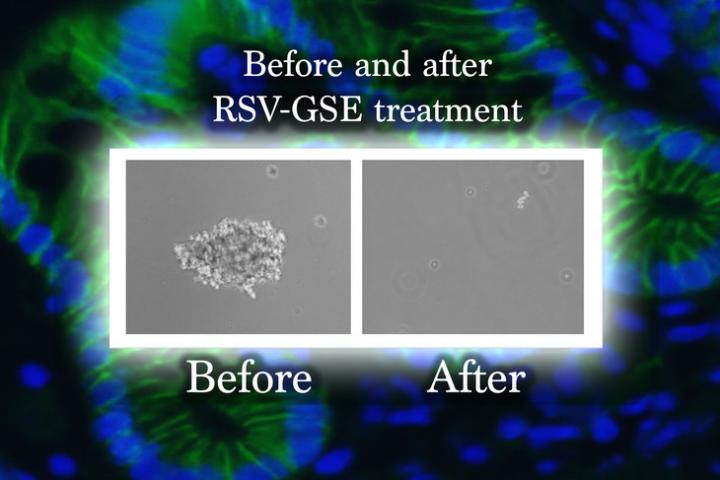
Credit: Patrick Mansell
Compounds from grapes may kill colon cancer stem cells both in a petri dish and in mice, according to a team of researchers.
The compounds — resveratrol –which are found in grape skins and seeds, could also eventually lead to treatments to help prevent colon cancer, said Jairam K.P. Vanamala, associate professor of food sciences, Penn State. Colorectal cancer is the second leading cause of cancer-related deaths in the U.S., according to the American Cancer Society.
"The combination of resveratrol and grape seed extract is very effective at killing colon cancer cells," said Vanamala, who is also a faculty member at the Penn State Hershey Cancer Institute. "And what we're learning is the combination of these compounds is not toxic to healthy cells."
The researchers, who reported their findings in a recent issue of BMC Complementary and Alternative Medicine, suggest that the findings could pave the way for clinical testing of the compounds on human colon cancer, which is the second most common cancer in women and the third in men. If successful, the compounds could then be used in a pill to help prevent colon cancer and lessen the recurrence of the disease in colon cancer survivors.
"We are particularly interested in targeting stem cells because, according to cancer stem-cell theory, cancerous tumors are driven by cancer stem cells," said Vanamala. "Cancer stem cells are capable of self-renewal, cellular differentiation and maintain their stem cell-like characteristics even after invasion and metastasis."
When taken separately in low doses, resveratrol and grape seed extract are not as effective against cancer stem-cell suppression as when they are combined together, according to the researchers.
The combined effect of grape seed extract and resveratrol may offer clues as to why cultures with a plant-based diet tend to have lower colon cancer rates, said Vanamala. These diets may naturally be providing a shotgun approach to cancer prevention by using a wide variety of beneficial compounds to target multiple pathways that cancer stem cells use to survive.
"This also connects well with a plant-based diet that is structured so that the person is getting a little bit of different types of plants, of different parts of the plant and different colors of the plant," said Vanamala. "This seems to be beneficial for not only promoting bacterial diversity, but also preventing chronic diseases and eliminating the colon cancer stem cells."
If successful in human trials, the compounds could be taken in low doses using currently available supplements for grape seed extract and resveratrol, which are also found in wine.
However, he added that there is still more work to do to understand the mechanism behind the anti-cancer properties of the grape extract, as well as other colorful fruits and vegetables. Further research would be aimed at finding specific anti-cancer compounds and better understanding how those compounds work synergistically to create more effective colon-cancer prevention and treatment strategies.
For the animal study, the researchers separated 52 mice with colon cancer tumors into three groups, including a control group and groups that were fed either the grape compounds or sulindac, an anti-inflammatory drug, which was chosen because a previous study showed it significantly reduced the number of tumors in humans.
The incidence of tumors was suppressed in the mice consuming the grape compounds alone by 50 percent, similar to the rate in the group consuming the diet with sulindac.
###
Vanamala worked with Joshua D. Lambert and Ryan J. Eilas, both associate professors of food science; Lavanya Reddivari, assistant professor of plant science; Sridhar Radhakrishnan, a postdoctoral scholar and Venkata Charepalli, a doctoral student, all from Penn State; and Ramakrishna Vadde, a visiting scientist from India.
The United States Department of Agriculture supported this work.
Media Contact
Matt Swayne
[email protected]
814-865-9481
@penn_state
http://live.psu.edu
Original Source
http://news.psu.edu/story/450657/2017/06/19/research/grape-based-compounds-kill-colon-cancer-stem-cells-mice
############
Story Source: Materials provided by Scienmag





